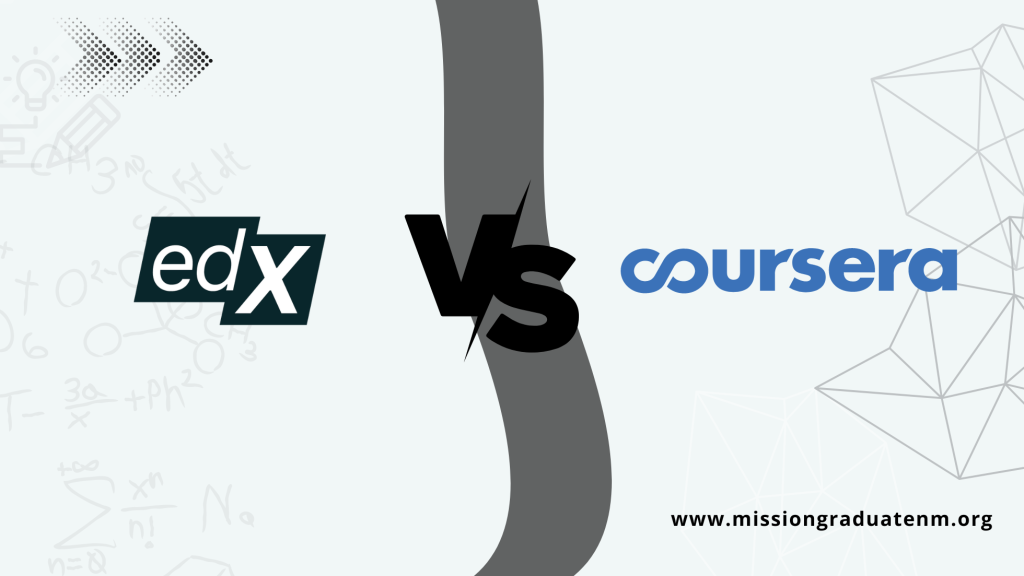Udacity vs Coursera are two of the most popular online learning platforms, each offering unique advantages for modern learners. Choosing the right platform depends on your goals, whether you’re seeking university-level academics or hands-on industry projects. Coursera excels in academic diversity and accredited certificates, making it ideal for formal education seekers.
Meanwhile, Udacity focuses on real-world tech skills with project-based learning, making it a strong fit for those aiming for a tech career.
In this post, I’ll share a detailed comparison that breaks down pricing, course variety, structure, instructors, and more to help you decide which platform better suits your educational and career objectives.
Udacity vs Coursera: Verdict at a Glance
Choose Coursera if you’re looking for various academic and professional courses across multiple disciplines, prefer a more traditional learning structure, or want to earn accredited degrees online.
Go with Udacity if you’re focused on tech and data science skills, enjoy project-based learning, and want direct connections to industry partners for career advancement.
| Parameters | Udacity | Coursera |
|---|---|---|
| Core Idea | Data engineering, programming analysis, business analytics, AI programming with Python, etc. | Offering courses on programming, business, art & design, data science, humanities, health & medicine, data science, etc. |
| Number Of Courses | 200 free courses & 78 Nanodegree courses | 7000+ courses in Coursera Plus |
| Course Format | Pre-recorded video lectures | Pre-recorded video lectures |
| Ease Of Use | Easy to navigate & user-friendly | User-friendly interface |
| Instructors | Instructors come from a variety of professional backgrounds (they don’t necessarily have a teaching background) | Professors from renowned universities and industry experts |
| Certificates | Available with the nano-degree courses | Comes with paid courses |
| Price | Starts from $399 | Starts from $29 |
| Return Policy | 7-day return policy | 14-day return policy available only with the annual subscription |
| Additional Support | Call & email support | Call & email support |
Which Platform is Right for You?
Coursera & Udacity are the two top online learning institutions that offer courses in diverse learning fields, including data science, computer science, programming, business & art, humanities, etc.
The best part about Udacity is its wide availability of free courses. There are more than 200 free options.
In contrast, Coursera has an even vaster library of 7000+ courses, 1600+ specializations, and 600+ guided projects curated and taught by university professors and industry experts.
But which platform would meet your learning needs? You should:
Choose Udacity if
- You’re interested in robotics, AI, programming, data science, etc.
- You’re interested in specific career tracks and nano degree programs
- You want to learn from top institutes like AT&T, Google, etc.
- You prefer hands-on, project-based learning experiences.
- Need a platform with quality courses, free of cost
- Looking for self-paced learning options
Choose Coursera if
- You’re interested in academics and professional courses
- You want an e-learning platform with a wide variety of courses
- Want to access classes from top universities and institutions worldwide
- You want to earn certificates and credentials from top global universities
- Want an e-learning institute with flexible course timelines
Udacity Pros & Cons
Pros
- Hands-on, project-based learning experience
- Hands-on programs are created in collaboration with institutions like Google
- 200+ free courses
- Special career service courses with interview preparation, resume review, and job search support
- Updated curriculum covering the latest industry insights
Cons
- Udacity courses are quite expensive
- No university accredits the certificates
Coursera Pros and Cons
Pros
- Courses curated by top universities & institutions like Yale, Stanford University, Google, etc.
- Have a wide range of free courses
- Paid courses start from just $29
- Active community and discussion forums for support and interaction
- Opportunity to earn certificates from reputable institutes
Cons
- No certificates for free courses
- Limited hands-on or project-based learning options
Udacity & Coursera Overview
You got a quick sneak peek of what Udacity and Coursera offer. Here is a better overview that will give you a clearer idea of which option would suit your learning needs the best.
Udacity Overview
Udacity is popular for offering various courses and Nanodegree programs in digital technology. It was founded in 2011 to provide accessible and industry-relevant education to learners worldwide.
One of Udacity’s critical features is its practical project-based learning. The courses and learning paths are designed to equip students with in-demand skills and help them climb the ladder of success.
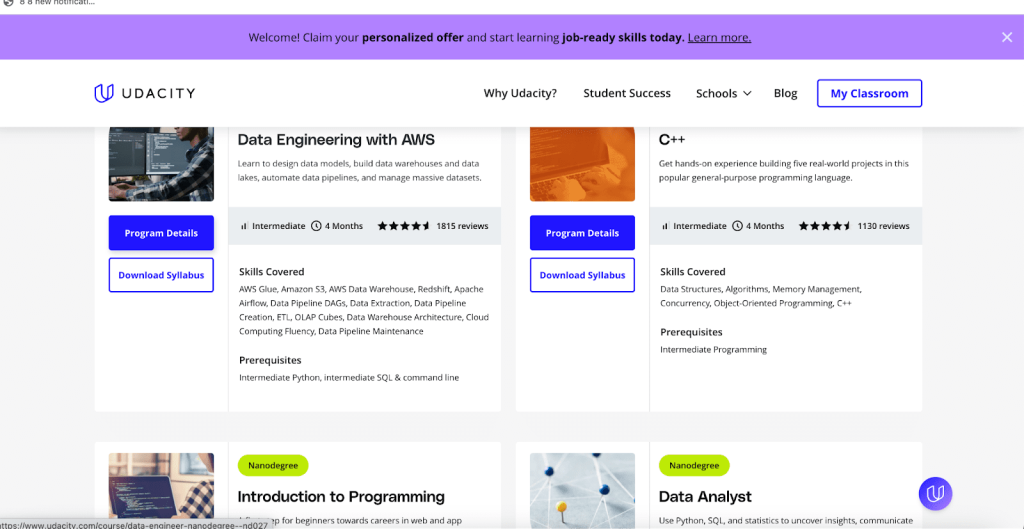
The Nanodegree programs are paid courses that come with certificates. These programs are more detailed and prepare you for the professional field.
Udacity courses, especially the Nanodegree programs, are created by industry experts in partnership with top global institutes or organizations, such as Google, Facebook, etc.
Coursera Overview
Coursera’s extensive catalog covers various disciplines, including programming, humanities, data sciences, art and design, and business.
The platform has been offering quality education since 2012, and currently, Coursera Plus has more than 7000 courses to choose from.
One key reason for Coursera’s wide popularity is its programs, which were created by top universities like Yale, Stanford, the University of London, etc.
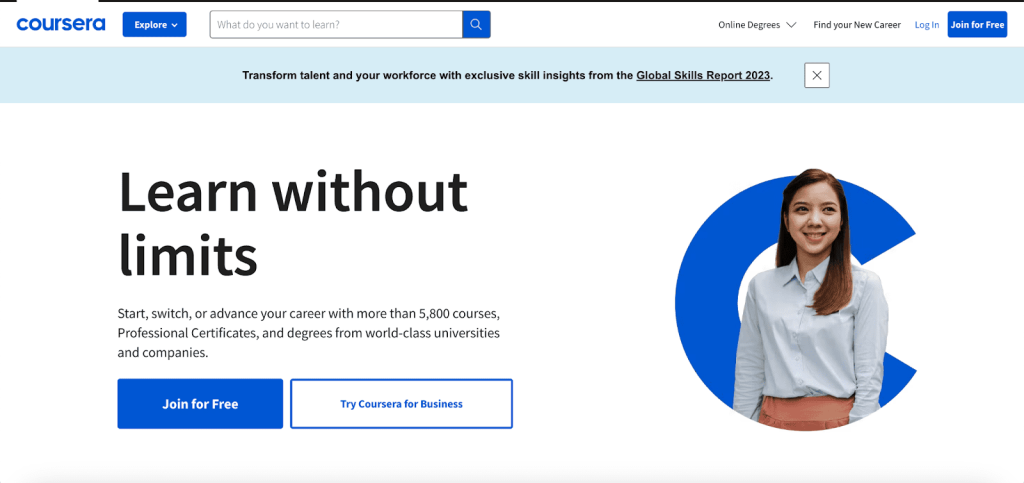
These programs offer learners the opportunity to earn an informal certificate who did not have the chance to attend these prestigious institutions. Coursera also has several free courses. You can try some free options first and get a first-hand experience of the learning structure.
Check my honest review and experience to know if Coursera is worth it!
Key Difference Between Udacity & Coursera: Based On Various Parameters
Here, I have reviewed both platforms based on various parameters. Without further ado, let’s have a detailed look:
The core idea of the course content
Udacity
The core idea of Udacity courses is to provide practical, skills-based education that prepares learners for real-world careers in the technology industry. By offering courses that teach relevant and in-demand skills, Udacity aims to bridge the gap between traditional education and industry needs.
Udacity courses are in-depth and created in collaboration with industry experts and leading companies.
Udacity also regularly updates its course content to ensure you don’t miss the latest industry insights.
Coursera
Coursera aims to make learning opportunities available to a global audience and empower individuals to acquire knowledge, develop skills, and advance their careers.
You get diverse courses covering various disciplines, including academic subjects, professional skills, and emerging fields. Besides, you can explore topics ranging from computer science and business to humanities, health sciences, and more.
Number of Courses Offered By Coursera and Udacity
Let’s take a look at the courses offered by Udacity and Coursera.
Udacity Courses
Udacity offers courses in various categories, covering multiple topics and disciplines.
Here are some of the course categories available on Udacity:
- AI and Machine Learning
- Data Science & Data Analysts
- Programming & Development
- Web Development & Front End Development
- Back-End Development and Full-Stack Development
- Cloud Computing and DevOps
- Autonomous Systems and Robotics
- Digital Marketing and Growth
- Business and Entrepreneurship
- Product Management
- Cybersecurity
- Virtual Reality (VR) and Augmented Reality (AR)
- Computer Vision
- Natural Language Processing (NLP)
- Blockchain and Cryptocurrency
- Game Development
- UX Design and User Research
- Mobile App Development
- Software Testing and Quality Assurance
- Project Management
Coursera Courses
Coursera Plus has 7000 + courses in 11 categories, including:
- Data Science
- Business
- Computer Science
- Social Sciences
- Health
- Personal Development
- Arts & Humanities
- Language Learning
- Physical Science & Engineering
- Information Technology
- Math and Logic
Besides the single courses, Coursera has learning paths, a selection of courses from the same program that can help you master a particular subject.
If you’re just getting started and unsure of where to begin, here is a rounded-up selection of some of the best options:
- Machine Learning by Stanford University
- Google’s UX Design
- Excel Skills for Business by Macquarie University
- Google Ads for Beginners- Paid Media
- IBM Data Analysts
- IBM Cyber Security Analysts
- Social Work: Practice, Policy, and Research by Michigan University
- Bachelor of Science in Computer Science by the University of London
- Meta Marketing Analysts
- Google IT Support
Course Format of Udacity
Udacity Nanodegree courses include video lectures presented by instructors or industry professionals and are designed to explain key concepts, demonstrate examples, and provide guidance on the subject matter.
Some quizzes or assessments help reinforce the understanding of the lectures. These assessments may be multiple-choice questions, coding exercises, or other interactive elements that assess knowledge and provide immediate feedback.
Discussion forums and communities are also available where you can ask questions, seek clarification, and participate in discussions related to the course content. Instructors, mentors, and fellow learners may contribute to these forums, providing additional support and insights.
Coursera Course Structure
Coursera programs are also based on video lectures presented by instructors or experts in the field. These lectures cover the course content and are designed to provide in-depth explanations, demonstrations, and examples to help you understand the subject matter.
The programs usually include assigned readings, articles, or other supplementary materials that provide additional context and resources to support the course content.
You can also access discussion forums to engage with fellow learners and instructors and clarify your doubts.
Key Features of Udacity and Coursera
Let’s look at the key features of both online learning platforms.
Udacity Key Features:
- 200+ free courses & around 100 Nanodegree programs
- Has monthly subscription and individual course purchase options
- Courses are accompanied by graded quizzes and assignments
- Hands-on and project-based learning experience
- Industry partnerships and collaborations
- Self-paced learning opportunity
Coursera Key Features:
- Self-paced learning
- 2000+ free courses
- 7000+ course options
- Institution-level learning programs
- Regularly updated content to meet the changing industry needs
- A wide variety of courses from top global universities and institutions
- Access to an activity community of learners to ask queries, share work, and collaborate with other students.
Instructors: Coursera vs Udacity
Teachers and instructors are the core pillars of any learning institute. Fortunately, Udacity and Coursera have exceptional instructors with years of experience in their respective fields.
Here is a better look at the Udacity and Coursera instructors:
Udacity Instructors
Udacity has set criteria for selecting instructors. They must have records of professional experience, undergo an interview, and submit some form of assignment.
In addition to them, there are instructors from reputed institutes, such as Melissa Hui, founder of Context Leap, and Gabe Ruttner, founder of FeatherDocs.
Udacity also has guest instructors who are recognized professionals in their fields in Nanodegree programs and courses.
Coursera Instructors
Coursera instructors come from diverse backgrounds, including academia, industry professionals, and subject matter experts. Professors and instructors from universities like Yale, Princeton, Standford, etc., teach courses on Coursera.
Besides that, some industry professionals with extensive knowledge and experience in their respective fields teach on Coursera and share their tips and insights.
Some Coursera instructors are Nobel prize winners, best-selling authors, and C-suite executives.
Pricing & Membership
Coursera has a flexible pricing option with different price plans suitable for learners in different fields. Does Udacity match Coursera’s pricing plans? Let’s take a look:
Udacity Price Structure
Udacity has a different price structure, which is unlike most learning platforms. The prices vary depending on the duration and choice of programs.
Typically, Udacity degree-level programs start at $399 per month. But if you pay the entire advance, you can get a 4-month course for just $399.

More advanced-level courses can cost as much as $2000. These are Nanodegree programs that last six months or more.
It’s true that Udacity prices are slightly expensive and may not be affordable for students. But these are in-depth courses that prepare you for the professional world.
Coursera Price Structure
Coursera has three different pricing plans:
| Single Learning Program | Coursera Plus Monthly | Coursera Plus Annual |
|---|---|---|
| $49 to $79 per month | $59 per month | $399 per year |
You get a 14-day refund policy with the Coursera annual pricing plan. And the best part? You can 7 days Coursera free trial that you can claim!
Find detailed pricing of Coursera here.
You can explore the entire course library and get a first-hand experience of how you like the courses.
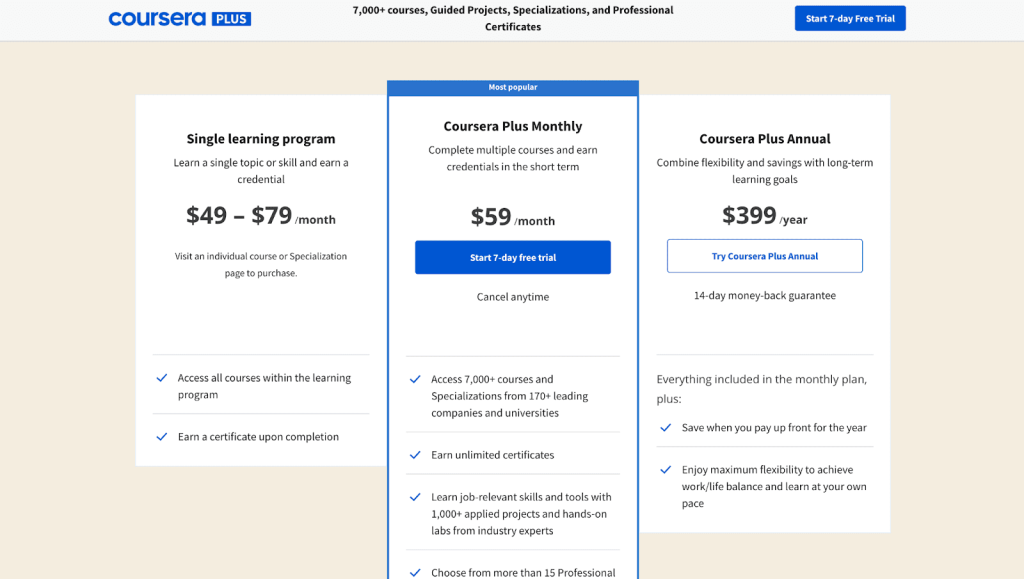
As I mentioned previously, there are also a lot of free courses on Coursera. While you don’t get a certificate with the free courses, they will help you upskill. Coursera also has a limited $1 offer that you can check out to see if you are eligible.
Tip: Get a 40% Coursera discount with our exclusive coupon code.
Customer support
Coursera vs. Udacity: Which customer support is better? Let’s find out:
Udacity Customer Support
Udacity has a help center to answer frequently asked questions and resolve any other technical issues. Contacting the customer care team is simple: Scroll down to the home page and click on the Contact Us tab.
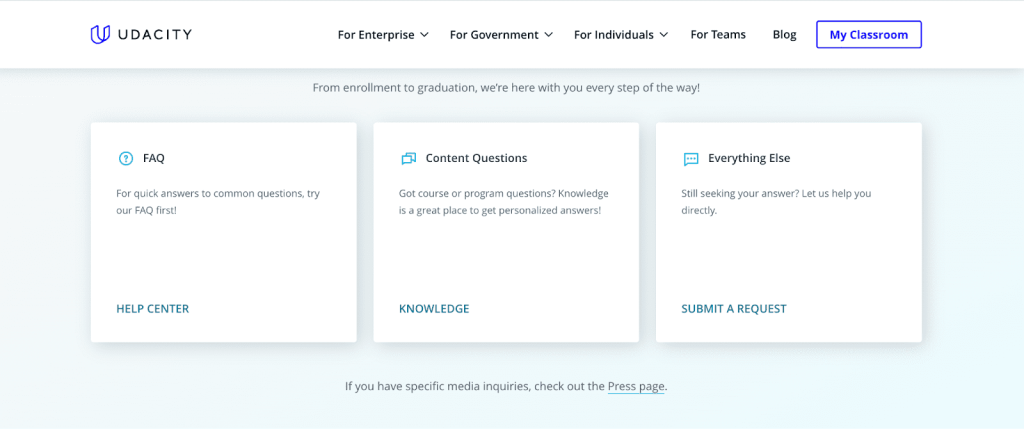
The FAQ section contains answers to common questions. If you need more assistance, you can submit a query and contact their team.
Coursera Customer Support
Coursera also has a helpful customer support team that is ready to assist you with any problem you face. Like Udacity, you can reach out to the FAQ section to find answers to basic queries.
If you need further assistance or if your question isn’t covered in the FAQs, you can talk to the customer representatives via email or phone.
If you don’t have the budget to buy courses, you can explore certain courses through the Coursera audit feature. Learn more with our detailed article on how to audit a Coursera course.
More Coursera Related Comparisons:
- Coursera vs LinkedIn Learning
- Coursera vs Pluralsight
- Other Alternatives to Coursera
- Edx vs Coursera
Final Thoughts: Coursera is Better Than Udacity In Terms of Courses
After spending significant time on both platforms, it’s clear that Udacity vs Coursera each have their strengths. The decision ultimately comes down to your personal learning preferences and professional goals.
If you’re looking for structured academic courses from top universities and want credentials that enhance your resume, Coursera is the right choice.
Udacity, on the other hand, excels in providing practical, hands-on experience in tech-related disciplines. Both platforms are user-friendly and offer flexible, self-paced learning paths.
If you’re still confused, you can check out free courses and trials, see which platform works best for you, and start your learning journey today!


